莫言写作的饥饿诱因渴望一日三餐有饺子吃
中华诺奖第一人——莫言

• 书中仔仔细细的描绘了两种清代的刑罚:凌迟和檀香刑。 • 凌迟,人身上包括眼睛在内,100多块肉,都会用各种刀具 来挖掉,为确保刑罚的残酷性,刽子手要保证刑犯不可以在挖掉 最后一块肉(心尖)之前死去。 • 檀香刑是这样的:用上等檀香木削成一根三指粗五尺长的檀 香木棍,一头尖一头钝,放进大铜锅里用上等香油煮三天三夜, 然后风干,让香油都渗透到檀香木棍里,使其硬韧适中,涩滑有 度. • 然后从犯人的肛门钉入,顺着脊骨往上钉,技术好,不流血,不 伤内脏,然后从嘴里钉出来。 • 檀香刑,各个细节更是讲究非凡。檀木,在油里浸泡多时,为的 是避免木头吸血而使刑犯在饱受痛苦前死去。一截檀木,在人体 五脏六腑之间游走,保证犯人几天几夜不会死,还可以把他从嘴 巴那边的棍头和肛门那里的棍尾挂起示众.
• 全书弥漫一种颗粒感的血腥暴力之美。 • 人物性格鲜活,情节环环相扣。 • 动荡时世众生相。趋炎附势,人与人之间互相攀 附,相互勾结又不断提防着。 • 莫言总喜欢把人写成妖魔,下笔极其血腥残里 没谁比他更擅长写杀戮写酷刑,他把变态升华成 了美学,字里行间透着血腥和疯狂。
• 这部小说完全是以一种喜剧性的话语方式来展示 悲剧性的精神内涵,且悲与喜在小说中都叙述得 浓彩重抹、登峰造极。这种两极化的高度整合, 不仅体现了莫言高超的叙事技能,也表明了《檀 香刑》绝不是一般意义上对传统小说创作模式的 复归,它是莫言在沉入民间之后,以自己特有的 艺术生命在激活民间话语的过程中所暴发出来的 独一无二的声音,是莫言对中国当下先锋文学的 再度开拓。
痴迷读书B
• 6岁进校读书,曾因骂老师是“奴隶主”受警告处 分。小学三年级时读了《林海雪原》、《青春之 歌》、《钢铁是怎样炼成的》等作品,受到文学 启蒙。12岁时读小学五年级,因“文革”爆发辍 学回家,以放牛割草为业,闲暇时读《三国演义 》
莫言的饥饿、死亡与孤独
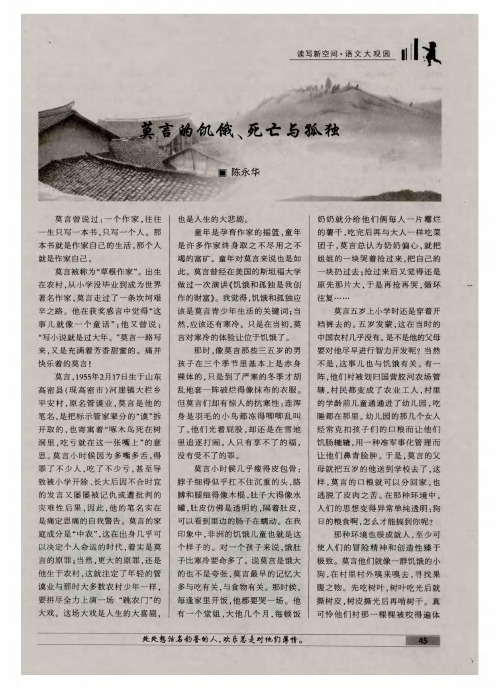
只能给她挑着罐子 。 邪 段 往 事 太 刺 激太打 击儿童管谟 业了 , 以至 他 把 它作 为 自 己成 为 作 家 的基 本 动 力 。 水 饺 可 能 是 莫 言 的最 爱 , 他在2 0 1 2 年 诺 奖 演说 《 讲故 事 的人 》 中说 :
法 的 另 一 种 意 外 效 果 是 很 多 人 都 练 出 了一 口锋 利 的牙 齿 , 莫 言 有 个 小 伙 伴 还 凭 那 时 练 就 的 一 种 特 异
功能 当上了电工 , 那 位 老 兄 当 电工 既 不 用钳 子 也 不 用 刀 子 。 铅 笔 粗 的
者大 多是农村人 ( 城 里 人 约 占百 分 之十八 ) , 因为在集 体化时代 , 队 里
钢丝 他~咬就断 1 1 9 6 1 年 春天 , 村
小拉来 了一车亮晶 晶的煤块 , 莫 言 他们 孤 陋寡 闻 , 不 知是啥 东 西 , 不 知 是 哪 个 拿 起 一 块 煤 就 咯 嘣 咯 嘣 地吃起来 , 那 香 甜 的 样 子 感 染 了 在 场 的所 有 人 , 他 们 哄 抢 着 一 拥 而
年 成很 差 , 庄 稼 几乎颗 粒 无收 , 春 节 前夕 , 上 级 说 是 要 让 人 民 群 众 在
大灾 之年过上 一个无忧 的春节 , 本 来发 过救济粮 的 , 但 中 农 基 本 上 不
老人碗里 。” 这 段 话 歌 颂 了 母 爱 的 博大 , 也 反 映 了 莫 言 饮 食 偏好 的 根 源。 他 曾 经 的 理 想 就 是 一 日三 餐 能 吃上水饺 ; 当他 听 说 当个 作 家 就 有 此殊遇时 , 他 就 萌 生 了 这 个 全 世 界 作家中最为可怜可 笑的理想 。 对 饥 饿 的 充 分 体 验 使 莫 言 成 为 一 个 对
关于莫言的励志故事
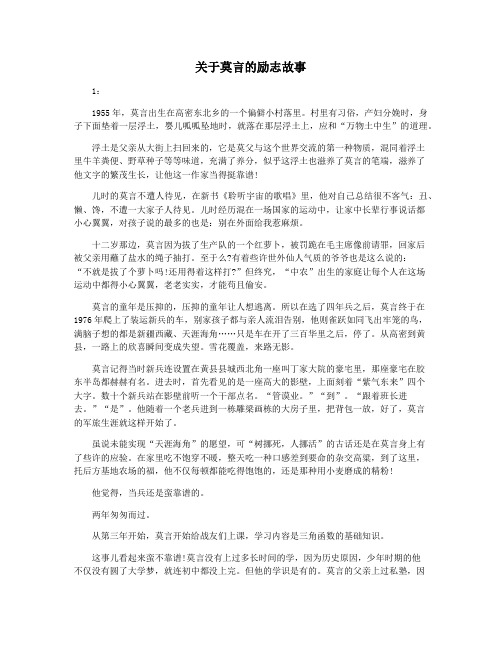
关于莫言的励志故事1:1955年,莫言出生在高密东北乡的一个偏僻小村落里。
村里有习俗,产妇分娩时,身子下面垫着一层浮土,婴儿呱呱坠地时,就落在那层浮土上,应和“万物土中生”的道理。
浮土是父亲从大街上扫回来的,它是莫父与这个世界交流的第一种物质,混同着浮土里牛羊粪便、野草种子等等味道,充满了养分,似乎这浮土也滋养了莫言的笔端,滋养了他文字的繁茂生长,让他这一作家当得挺靠谱!儿时的莫言不遭人待见,在新书《聆听宇宙的歌唱》里,他对自己总结很不客气:丑、懒、馋,不遭一大家子人待见。
儿时经历混在一场国家的运动中,让家中长辈行事说话都小心翼翼,对孩子说的最多的也是:别在外面给我惹麻烦。
十二岁那边,莫言因为拔了生产队的一个红萝卜,被罚跪在毛主席像前请罪,回家后被父亲用蘸了盐水的绳子抽打。
至于么?有着些许世外仙人气质的爷爷也是这么说的:“不就是拔了个萝卜吗!还用得着这样打?”但终究,“中农”出生的家庭让每个人在这场运动中都得小心翼翼,老老实实,才能苟且偷安。
莫言的童年是压抑的,压抑的童年让人想逃离。
所以在选了四年兵之后,莫言终于在1976年爬上了装运新兵的车,别家孩子都与亲人流泪告别,他则雀跃如同飞出牢笼的鸟,满脑子想的都是新疆西藏、天涯海角……只是车在开了三百华里之后,停了。
从高密到黄县,一路上的欣喜瞬间变成失望。
雪花覆盖,来路无影。
莫言记得当时新兵连设置在黄县县城西北角一座叫丁家大院的豪宅里,那座豪宅在胶东半岛都赫赫有名。
进去时,首先看见的是一座高大的影壁,上面刻着“紫气东来”四个大字。
数十个新兵站在影壁前听一个干部点名。
“管谟业。
”“到”。
“跟着班长进去。
”“是”。
他随着一个老兵进到一栋雕梁画栋的大房子里,把背包一放,好了,莫言的军旅生涯就这样开始了。
虽说未能实现“天涯海角”的愿望,可“树挪死,人挪活”的古话还是在莫言身上有了些许的应验。
在家里吃不饱穿不暖,整天吃一种口感差到要命的杂交高粱,到了这里,托后方基地农场的福,他不仅每顿都能吃得饱饱的,还是那种用小麦磨成的精粉!他觉得,当兵还是蛮靠谱的。
莫言:我对粮食有感情

莫言:我对粮食有感情
日前,莫言应邀前往北京101中学,结合自己生活和小说创作的经验与学校师生进行面对面的交流。
在座谈会上,莫言谈起了自己对粮食的热爱。
他说,“作为一个饱经过饥饿的人,我对粮食非常有感情,进城之后最喜欢逛超市的粮食区。
我会在大米、小米、绿豆等几个柜子间来回徘徊,不断抓起各种粮食放到鼻尖去闻气味。
无论我们的社会怎么发展,GDP增长到多高,科技取得多大的成绩,粮食还是最宝贵的。
手里抓着粮食,心里才特别踏实。
”
他表示,以前粮食珍贵得像金子一样。
“当年我决心写作,很大程度上是为了吃饱饭”。
他回忆,当年自己还是一个吃不饱饭的农村少年,有一个朋友跟他讲起济南的一个作家,因为写出了一部有名的小说,获得了数万元的版税,过上了“腐化”的生活,腐化的标志之一就是一天三顿吃饺子。
师生们被他的幽默感逗得大笑。
他接着说,“大家笑,说明现在社会上粮食充裕了,想什么时候吃饺子,只要有时间去饺子馆每顿都有得吃,但现在浪费粮食的'现象很严重,我每次看到浪费粮食的现象总是很痛心。
”
当学生问到如何看待厉行节约时,莫言回答:“希望不是一阵风的运动,而是成为大家自觉的习惯。
”
莫言介绍,自己的小说,也经常涉及粮食。
除了短篇小说《粮食》外,在《透明的红萝卜》里,那个一言不发的沉默少年,特别能忍受饥饿,有自己生活的影子。
(来源:光明日报)。
2014中考(初三)现代文阅读复习 莫言作品阅读及答案分析
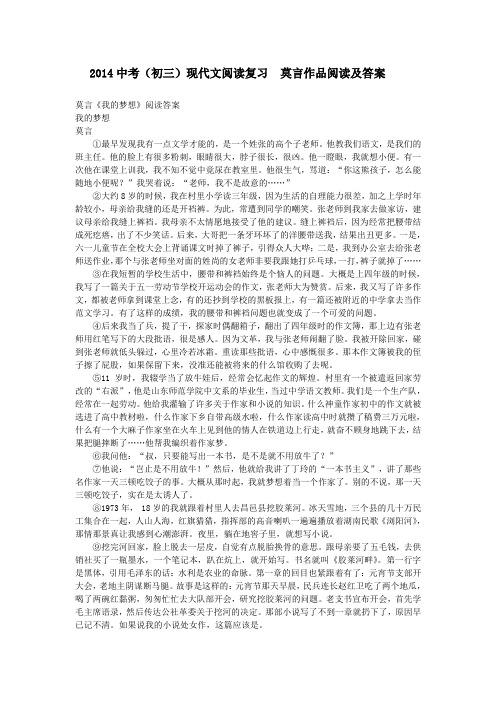
2014中考(初三)现代文阅读复习莫言作品阅读及答案莫言《我的梦想》阅读答案我的梦想莫言①最早发现我有一点文学才能的,是一个姓张的高个子老师。
他教我们语文,是我们的班主任。
他的脸上有很多粉刺,眼睛很大,脖子很长,很凶。
他一瞪眼,我就想小便。
有一次他在课堂上训我,我不知不觉中竟尿在教室里。
他很生气,骂道:“你这熊孩子,怎么能随地小便呢?”我哭着说:“老师,我不是故意的……”②大约8岁的时候,我在村里小学读三年级,因为生活的自理能力很差,加之上学时年龄较小,母亲给我缝的还是开裆裤。
为此,常遭到同学的嘲笑。
张老师到我家去做家访,建议母亲给我缝上裤裆。
我母亲不太情愿地接受了他的建议。
缝上裤裆后,因为经常把腰带结成死疙瘩,出了不少笑话。
后来,大哥把一条牙环坏了的洋腰带送我,结果出丑更多。
一是,六一儿童节在全校大会上背诵课文时掉了裤子,引得众人大哗;二是,我到办公室去给张老师送作业,那个与张老师坐对面的姓尚的女老师非要我跟她打乒乓球,一打,裤子就掉了……③在我短暂的学校生活中,腰带和裤裆始终是个恼人的问题。
大概是上四年级的时候,我写了一篇关于五一劳动节学校开运动会的作文,张老师大为赞赏。
后来,我又写了许多作文,都被老师拿到课堂上念,有的还抄到学校的黑板报上,有一篇还被附近的中学拿去当作范文学习。
有了这样的成绩,我的腰带和裤裆问题也就变成了一个可爱的问题。
④后来我当了兵,提了干,探家时偶翻箱子,翻出了四年级时的作文簿,那上边有张老师用红笔写下的大段批语,很是感人。
因为文革,我与张老师闹翻了脸。
我被开除回家,碰到张老师就低头躲过,心里冷若冰霜。
重读那些批语,心中感慨很多。
那本作文簿被我的侄子擦了屁股,如果保留下来,没准还能被将来的什么馆收购了去呢。
⑤11岁时,我辍学当了放牛娃后,经常会忆起作文的辉煌。
村里有一个被遣返回家劳改的“右派”,他是山东师范学院中文系的毕业生,当过中学语文教师。
我们是一个生产队,经常在一起劳动。
贪吃,好闲,学历低,这三个中国顶级作家坦诚自己写作的初衷

贪吃,好闲,学历低,这三个中国顶级作家坦诚自己写作的初衷莫言,余华,郑渊洁,无论在文学界的地位还是作品的销量,这三位都是中国最顶尖的作家。
但当被问到写作的初衷时,他们的回答却一点也不高大上。
莫言:渴望一天三顿饺子莫言的出生地高密是个特别偏僻穷困的地方,童年的记忆里都是野菜的苦涩味。
他很早就辍了学,村子里只有几本残破不全的《三国演义》,《西游记》。
他家有个邻居是右派,是山东大学中文系的学生,和莫言一起劳动的间隙,常常会给他讲些作家的故事。
他印象最深的是有个写红色经典的作家,生活极其腐败,竟然一天三顿都吃饺子,早晨、中午、晚上都吃饺子!本来以为只有毛主席才有这样的待遇。
莫言问:“如果我当了作家,是不是也可以一天三顿吃饺子?”“那当然,写出一本书,出版后就有很多稿费,一天三顿饺子没问题。
”笃定的语气让莫言坚定了为过上一天三顿饺子的幸福生活而写作的梦想。
后来,这个梦想实现了,莫言成为了中国获得诺贝尔文学奖的第一人。
余华:只想闲逛不想上班余华的写作初衷也很搞笑。
之前他在卫生院上班,师傅70多岁,身体不好,拔牙只示范了一遍,之后活就都是余华的了,一天要拔八个小时。
余华很不喜欢这个工作。
后来他发现文化馆的人特悠闲,整天在大街上玩儿,内心羡慕不已,找他们吐槽:“你们为什么不上班在街上闲逛。
”“逛大街就是上班啊!”那些人的回答让余华眼前一亮,这工作我喜欢!他苦思冥想怎么才能调到不上班,不工作,自由又自在的文化馆,想来想去写,小说吧。
为不工作而写的小说火了,他变成了人们吐槽的“靠《活着》而活着的余华”。
后来《活着》被张艺谋拍成电影获国际大奖。
至今的版税已经超过上千万。
在一次采访时,余华得意的说:郑渊洁:学历太低,工作难找和余华一样,郑渊洁骨子里也是个极不安分的人。
小学四年级时,老师布置作文《早起的鸟儿有虫吃》。
郑渊洁一想,不对啊,那早起的虫咋办呢?他于是洋洋洒洒的写下大作《早起的虫儿被鸟吃》,还很有思辨精神地问“人到底是鸟儿还是虫儿”。
莫言给乞丐饺子红薯干作文

莫言给乞丐饺子红薯干作文在一个阳光明媚的下午,我正悠闲地走在街上,突然瞧见一个乞丐,坐在路边,满脸沧桑。
心里一动,不禁想,哎,这人肯定饿了,咱们不能让他空着肚子。
于是,我决定给他买点吃的。
可我想,买什么好呢?快餐?可那油腻腻的,估计他也不喜欢。
我心里琢磨着,最后决定给他买饺子和红薯干,毕竟饺子热乎乎的,红薯干甜甜的,应该能让他开心。
走到饺子店,门口的香味扑鼻而来,简直让人忍不住想大口吃起来。
我跟店老板点了几个饺子,老板笑着问:“要什么馅的?”我随口说:“来个猪肉白菜的,再加点韭菜鸡蛋的,色香味俱全!”看着老板在厨房忙碌,我心里也乐滋滋的。
等饺子煮好,捞出来的时候,那热气腾腾的样子,让我简直口水直流。
我把饺子装好,心想着乞丐看到这顿美餐,肯定会露出大大的笑容。
我又跑到旁边的小店,挑选了一袋红薯干。
那红薯干色泽金黄,咬上一口,甜得像蜜一样,绝对是个好选择。
买好东西后,我满心欢喜地走回去,心里想着,这一举动可是大善事啊!我想象着乞丐吃到饺子和红薯干时那副满足的样子,简直就像是在脑海中放电影。
终于,我找到了那位乞丐。
他坐在那里,眼神中透露着一丝疲惫,但当我把食物递过去时,他的脸上瞬间绽放出笑容,简直就像是春天的花朵。
我说:“来,吃点东西,别客气!”乞丐接过饺子,眼中闪烁着感激的光芒,嘴里嘟囔着:“谢谢你,真的谢谢!”我心里那个高兴啊,真是看一眼就让人倍感温暖。
看着他狼吞虎咽地吃着饺子,我忍不住问:“好吃吗?”他笑着点头:“太好吃了,我都快忘了饺子的味道了!”这时候,我才意识到,其实一顿简单的饭菜,能给一个人带来多大的快乐啊!乞丐的手指上沾满了饺子的汁,满脸幸福地吃着红薯干,像个小孩儿一样,丝毫没有顾忌。
这一幕让我心里暖暖的,觉得这世界其实还是很美好的。
我们常常忙忙碌碌,忽略了身边的小事,而这些小事,可能正是改变别人生活的关键。
就这样,乞丐吃得津津有味,而我则在旁边静静地看着,心中充满了满足感。
生活其实就是这样,点滴之间充满了温情,人与人之间的关心,常常能让人感觉到无比的温暖。
我的梦想(莫言)阅读答案
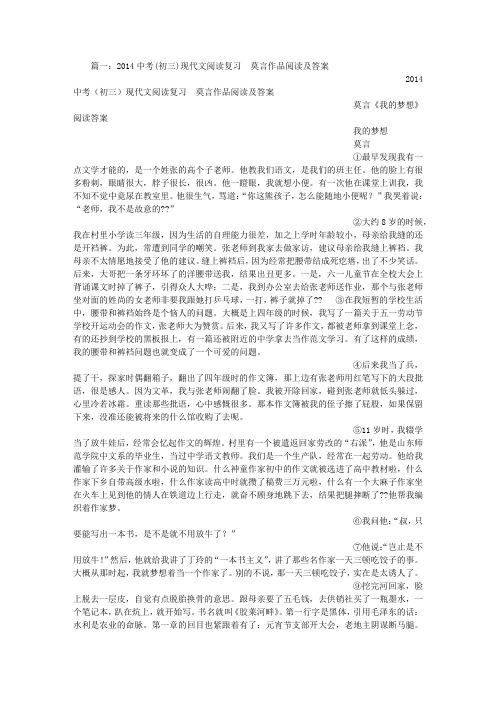
篇一:2014中考(初三)现代文阅读复习莫言作品阅读及答案2014中考(初三)现代文阅读复习莫言作品阅读及答案莫言《我的梦想》阅读答案我的梦想莫言①最早发现我有一点文学才能的,是一个姓张的高个子老师。
他教我们语文,是我们的班主任。
他的脸上有很多粉刺,眼睛很大,脖子很长,很凶。
他一瞪眼,我就想小便。
有一次他在课堂上训我,我不知不觉中竟尿在教室里。
他很生气,骂道:“你这熊孩子,怎么能随地小便呢?”我哭着说:“老师,我不是故意的??”②大约8岁的时候,我在村里小学读三年级,因为生活的自理能力很差,加之上学时年龄较小,母亲给我缝的还是开裆裤。
为此,常遭到同学的嘲笑。
张老师到我家去做家访,建议母亲给我缝上裤裆。
我母亲不太情愿地接受了他的建议。
缝上裤裆后,因为经常把腰带结成死疙瘩,出了不少笑话。
后来,大哥把一条牙环坏了的洋腰带送我,结果出丑更多。
一是,六一儿童节在全校大会上背诵课文时掉了裤子,引得众人大哗;二是,我到办公室去给张老师送作业,那个与张老师坐对面的姓尚的女老师非要我跟她打乒乓球,一打,裤子就掉了?? ③在我短暂的学校生活中,腰带和裤裆始终是个恼人的问题。
大概是上四年级的时候,我写了一篇关于五一劳动节学校开运动会的作文,张老师大为赞赏。
后来,我又写了许多作文,都被老师拿到课堂上念,有的还抄到学校的黑板报上,有一篇还被附近的中学拿去当作范文学习。
有了这样的成绩,我的腰带和裤裆问题也就变成了一个可爱的问题。
④后来我当了兵,提了干,探家时偶翻箱子,翻出了四年级时的作文簿,那上边有张老师用红笔写下的大段批语,很是感人。
因为文革,我与张老师闹翻了脸。
我被开除回家,碰到张老师就低头躲过,心里冷若冰霜。
重读那些批语,心中感慨很多。
那本作文簿被我的侄子擦了屁股,如果保留下来,没准还能被将来的什么馆收购了去呢。
⑤11岁时,我辍学当了放牛娃后,经常会忆起作文的辉煌。
村里有一个被遣返回家劳改的“右派”,他是山东师范学院中文系的毕业生,当过中学语文教师。
作文范文之莫言半碗饺子作文
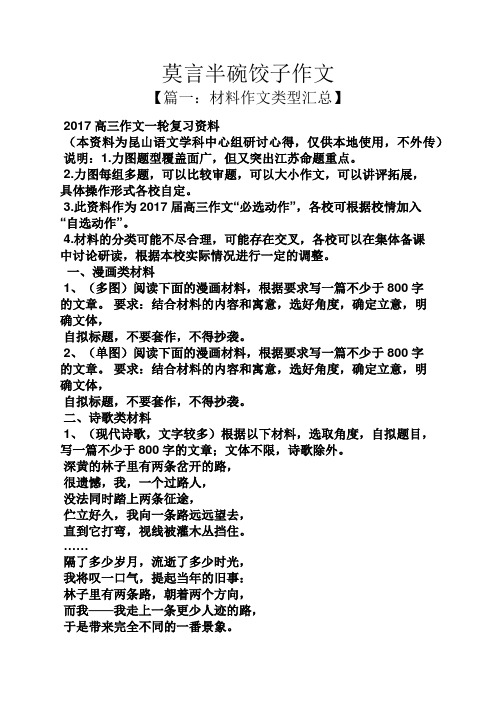
莫言半碗饺子作文【篇一:材料作文类型汇总】2017高三作文一轮复习资料(本资料为昆山语文学科中心组研讨心得,仅供本地使用,不外传)说明:1.力图题型覆盖面广,但又突出江苏命题重点。
2.力图每组多题,可以比较审题,可以大小作文,可以讲评拓展,具体操作形式各校自定。
3.此资料作为2017届高三作文“必选动作”,各校可根据校情加入“自选动作”。
4.材料的分类可能不尽合理,可能存在交叉,各校可以在集体备课中讨论研读,根据本校实际情况进行一定的调整。
一、漫画类材料1、(多图)阅读下面的漫画材料,根据要求写一篇不少于800字的文章。
要求:结合材料的内容和寓意,选好角度,确定立意,明确文体,自拟标题,不要套作,不得抄袭。
2、(单图)阅读下面的漫画材料,根据要求写一篇不少于800字的文章。
要求:结合材料的内容和寓意,选好角度,确定立意,明确文体,自拟标题,不要套作,不得抄袭。
二、诗歌类材料1、(现代诗歌,文字较多)根据以下材料,选取角度,自拟题目,写一篇不少于800字的文章;文体不限,诗歌除外。
深黄的林子里有两条岔开的路,很遗憾,我,一个过路人,没法同时踏上两条征途,伫立好久,我向一条路远远望去,直到它打弯,视线被灌木丛挡住。
……隔了多少岁月,流逝了多少时光,我将叹一口气,提起当年的旧事:林子里有两条路,朝着两个方向,而我——我走上一条更少人迹的路,于是带来完全不同的一番景象。
2、(现代诗歌,文字较少)阅读下面这首诗,根据要求作文错觉泰戈尔河的此岸暗自叹息——“我相信,一切欢乐都在对岸。
”河的彼岸一声长叹:“唉,也许,幸福尽在对岸。
”你品读这首诗产生了哪些联想或感悟呢?请根据你的联想或感悟写一篇文章。
三、任务驱动型1、阅读下面的材料,根据要求写一篇不少于800字的文章。
某报社为了发掘有温度和人情味的新闻,引导读者以温暖的视角看待社会,开设了《暖闻》专栏。
编辑部收到三则新闻:一位卖油条的青年多年坚持不用有害的“复炸油”炸油条,给顾客提供新鲜健康的油条,被网友称赞为最帅的良心“油条哥”。
莫言《我为白菜狂的日子》阅读练习及答案

莫言《我为白菜狂的日子》阅读练习及答案莫言《我为白菜狂的日子》阅读练习及答案「篇一」⑴1967年冬天,我12岁那年,临近春节的一个早晨,母亲苦着脸,心事重重地在屋子里走来走去,时而揭开炕席的一角,掀动几下铺炕的麦草,时而拉开那张老桌子的抽屉,扒拉几下破布头烂线团。
母亲叹息着,并不时把目光抬高,瞥一眼那三棵吊在墙上的白菜。
最后,母亲的目光锁定在白菜上,端详着,终于下了决心似的,叫着我的乳名,说:“社斗,去找个篓子来吧”⑵“娘,”我悲伤地问:“您要把它们”⑶“今天是大集。
”母亲沉重地说。
⑷“可是,您答应过的,这是我们留着过年的”话没说完,我的眼泪就涌了出来。
⑸母亲的眼睛湿漉漉的,但她没有哭,她有些恼怒地说:“这么大的汉子了,动不动就抹眼泪,像什么样子!”⑹“我们种了一百零四棵白菜,卖了一百零一棵,只剩下这三棵了说好了留着过年的,说好了留着过年包饺子的”我哽咽着说。
⑺母亲靠近我,掀起衣襟,擦去了我脸上的泪水。
透过蒙的泪眼,我看到母亲把那三棵白菜从墙上钉着的木橛子上摘了下来,放进了篓子里。
⑻到了集上。
母亲让我走,去上学,我也想走,但我看到一个老太太朝着我们的白菜走了过来。
她用细而沙哑的嗓音问白菜的价钱。
母亲回答了她。
她摇摇头,看样子是嫌贵。
但是她没有走,而是蹲下,翻动着我们的三棵白菜。
她把那棵最小的白菜上那半截欲断未断的根拽了下来。
然后她又逐棵地戳着我们的白菜,用弯曲的、枯柴一样的手指。
她撇着嘴,说我们的白菜卷得不紧。
母亲用忧伤的声音说:“大婶子啊,这样的白菜您还嫌卷得不紧,那您就到市上去看看吧,看看哪里还能找到卷得更紧的吧。
”⑼我对这个老太太充满了恶感,你拽断了我们的白菜根也就罢了,可你不该昧着良心说我们的白菜卷得不紧。
我忍不住冒出了一句话:“再紧就成了石头蛋子了!”⑽老太太抬起头,惊讶地看着我,问母亲:“这是谁?是你的儿子吗?”⑾“是老小,”母亲回答了老太太,转回头批评我:“小小孩儿,说话没大没小的!”⑿老太太用手撕扯着那棵最小的白菜上那层已经干枯的菜帮子。
论莫言的饥饿情结-最新年精选文档
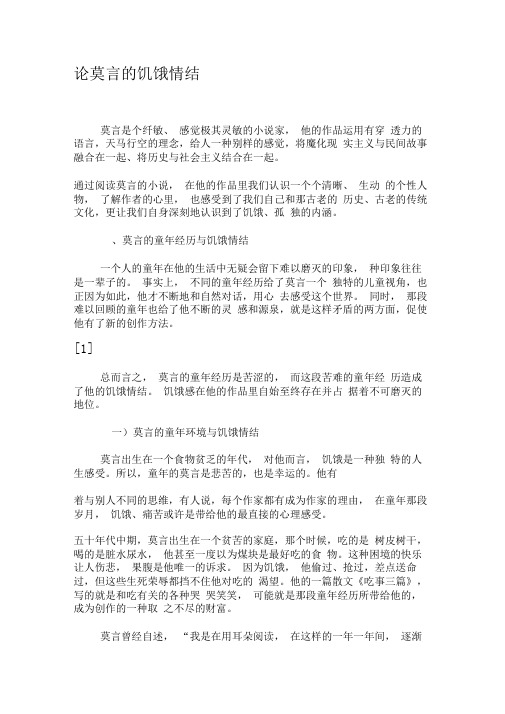
论莫言的饥饿情结莫言是个纤敏、感觉极其灵敏的小说家,他的作品运用有穿透力的语言,天马行空的理念,给人一种别样的感觉,将魔化现实主义与民间故事融合在一起、将历史与社会主义结合在一起。
通过阅读莫言的小说,在他的作品里我们认识一个个清晰、生动的个性人物,了解作者的心里,也感受到了我们自己和那古老的历史、古老的传统文化,更让我们自身深刻地认识到了饥饿、孤独的内涵。
、莫言的童年经历与饥饿情结一个人的童年在他的生活中无疑会留下难以磨灭的印象,种印象往往是一辈子的。
事实上,不同的童年经历给了莫言一个独特的儿童视角,也正因为如此,他才不断地和自然对话,用心去感受这个世界。
同时,那段难以回顾的童年也给了他不断的灵感和源泉,就是这样矛盾的两方面,促使他有了新的创作方法。
[1]总而言之,莫言的童年经历是苦涩的,而这段苦难的童年经历造成了他的饥饿情结。
饥饿感在他的作品里自始至终存在并占据着不可磨灭的地位。
一)莫言的童年环境与饥饿情结莫言出生在一个食物贫乏的年代,对他而言,饥饿是一种独特的人生感受。
所以,童年的莫言是悲苦的,也是幸运的。
他有着与别人不同的思维,有人说,每个作家都有成为作家的理由,在童年那段岁月,饥饿、痛苦或许是带给他的最直接的心理感受。
五十年代中期,莫言出生在一个贫苦的家庭,那个时候,吃的是树皮树干,喝的是脏水尿水,他甚至一度以为煤块是最好吃的食物。
这种困境的快乐让人伤悲,果腹是他唯一的诉求。
因为饥饿,他偷过、抢过,差点送命过,但这些生死荣辱都挡不住他对吃的渴望。
他的一篇散文《吃事三篇》,写的就是和吃有关的各种哭哭笑笑,可能就是那段童年经历所带给他的,成为创作的一种取之不尽的财富。
莫言曾经自述,“我是在用耳朵阅读,在这样的一年一年间,逐渐培养了我与大自然、我与天地的密切关系,培养了我的历史观、道德观,更为重要的是培养起我敏锐的想象力和那颗永远保持不懈的童心。
我之所以能够坚持不懈地写作,并且一直充满着那种不知天高地厚的盲目自信,也是我自己用耳朵去阅读感受所获得的宝贵资源。
(现代文阅读题)莫言的三篇阅读及答案解析
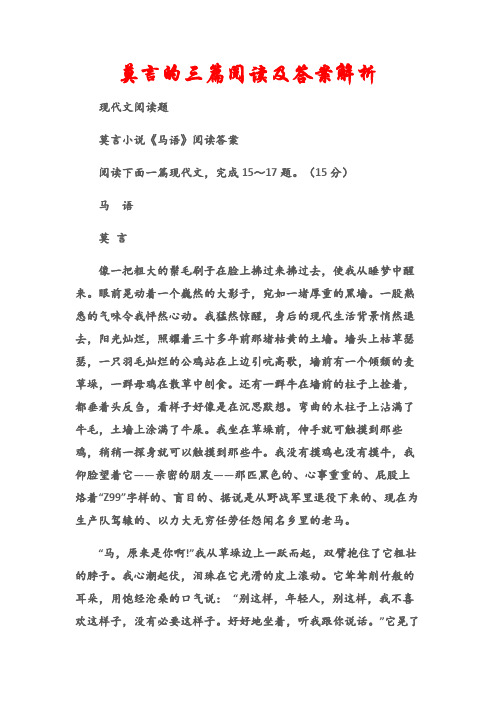
莫言的三篇阅读及答案解析现代文阅读题莫言小说《马语》阅读答案阅读下面一篇现代文,完成15~17题。
(15分)马语莫言像一把粗大的鬃毛刷子在脸上拂过来拂过去,使我从睡梦中醒来。
眼前晃动着一个巍然的大影子,宛如一堵厚重的黑墙。
一股熟悉的气味令我怦然心动。
我猛然惊醒,身后的现代生活背景悄然退去,阳光灿烂,照耀着三十多年前那堵枯黄的土墙。
墙头上枯草瑟瑟,一只羽毛灿烂的公鸡站在上边引吭高歌,墙前有一个倾颓的麦草垛,一群母鸡在散草中刨食。
还有一群牛在墙前的柱子上拴着,都垂着头反刍,看样子好像是在沉思默想。
弯曲的木柱子上沾满了牛毛,土墙上涂满了牛屎。
我坐在草垛前,伸手就可触摸到那些鸡,稍稍一探身就可以触摸到那些牛。
我没有摸鸡也没有摸牛,我仰脸望着它——亲密的朋友——那匹黑色的、心事重重的、屁股上烙着“Z99”字样的、盲目的、据说是从野战军里退役下来的、现在为生产队驾辕的、以力大无穷任劳任怨闻名乡里的老马。
“马,原来是你啊!”我从草垛边上一跃而起,双臂抱住了它粗壮的脖子。
我心潮起伏,泪珠在它光滑的皮上滚动。
它耸耸削竹般的耳朵,用饱经沧桑的口气说:“别这样,年轻人,别这样,我不喜欢这样子,没有必要这样子。
好好地坐着,听我跟你说话。
”它晃了一下脖子,我的身体就轻如鸿毛般地脱离了地面,然后就跌坐在麦草垛边,伸手就可触摸那些鸡,稍稍一探身就可以触摸那些牛。
我端详着这个三十多年没有见面的老朋友。
它依然是当年的样子:硕大的头颅、伟岸的身躯、修长的四肢、瓦蓝的四蹄、蓬松的华尾、紧闭着的不知道什么原因盲了的双目。
于是,若干的情景就恍然如在眼前了。
我曾经多次揪它的尾毛做琴弓,它默默肃立,犹如一堵墙。
我多少次坐在它宽阔平坦的背上看小人书,它一动也不动,好像一艘搁浅了的船。
我多少次对邻村的小孩子炫耀它,编造它的光荣的历史,说它曾经驮着兵团司令冲锋陷阵,立过赫赫战功,它一声不吭,好像一块没有温度的铁。
我多少次向村里的老人请教,想了解它的历史,尤其想知道它是怎样瞎的,没人告诉我。
2020年高考语文《时文美文例文》第77期(28篇)优秀作文素材 新人教版
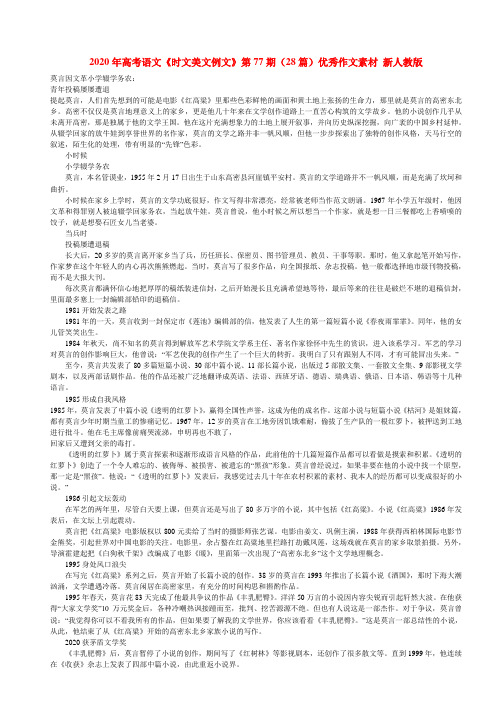
2020年高考语文《时文美文例文》第77期(28篇)优秀作文素材新人教版莫言因文革小学辍学务农:青年投稿屡屡遭退提起莫言,人们首先想到的可能是电影《红高粱》里那些色彩鲜艳的画面和黄土地上张扬的生命力,那里就是莫言的高密东北乡。
高密不仅仅是莫言地理意义上的家乡,更是他几十年来在文学创作道路上一直苦心构筑的文学故乡。
他的小说创作几乎从未离开高密,那是独属于他的文学王国。
他在这片充满想象力的土地上展开叙事,并向历史纵深挖掘,向广袤的中国乡村延伸。
从辍学回家的放牛娃到享誉世界的名作家,莫言的文学之路并非一帆风顺,但他一步步探索出了独特的创作风格,天马行空的叙述,陌生化的处理,带有明显的“先锋”色彩。
小时候小学辍学务农莫言,本名管谟业,1955年2月17日出生于山东高密县河崖镇平安村。
莫言的文学道路并不一帆风顺,而是充满了坎坷和曲折。
小时候在家乡上学时,莫言的文学功底很好,作文写得非常漂亮,经常被老师当作范文朗诵。
1967年小学五年级时,他因文革和得罪别人被迫辍学回家务农,当起放牛娃。
莫言曾说,他小时候之所以想当一个作家,就是想一日三餐都吃上香喷喷的饺子,就是想娶石匠女儿当老婆。
当兵时投稿屡遭退稿长大后,20多岁的莫言离开家乡当了兵,历任班长、保密员、图书管理员、教员、干事等职。
那时,他又拿起笔开始写作,作家梦在这个年轻人的内心再次熊熊燃起。
当时,莫言写了很多作品,向全国报纸、杂志投稿。
他一般都选择地市级刊物投稿,而不是大报大刊。
每次莫言都满怀信心地把厚厚的稿纸装进信封,之后开始漫长且充满希望地等待,最后等来的往往是破烂不堪的退稿信封,里面最多塞上一封编辑部铅印的退稿信。
1981开始发表之路1981年的一天,莫言收到一封保定市《莲池》编辑部的信,他发表了人生的第一篇短篇小说《春夜雨霏霏》。
同年,他的女儿管笑笑出生。
1984年秋天,尚不知名的莫言得到解放军艺术学院文学系主任、著名作家徐怀中先生的赏识,进入该系学习。
2021高考作文素材--莫言:故乡过年
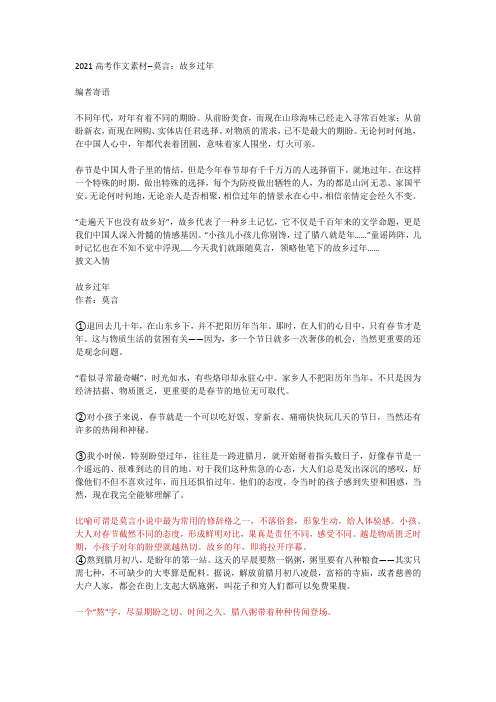
2021高考作文素材--莫言:故乡过年编者寄语不同年代,对年有着不同的期盼。
从前盼美食,而现在山珍海味已经走入寻常百姓家;从前盼新衣,而现在网购、实体店任君选择。
对物质的需求,已不是最大的期盼。
无论何时何地,在中国人心中,年都代表着团圆,意味着家人围坐,灯火可亲。
春节是中国人骨子里的情结,但是今年春节却有千千万万的人选择留下,就地过年。
在这样一个特殊的时期,做出特殊的选择,每个为防疫做出牺牲的人,为的都是山河无恙、家国平安。
无论何时何地,无论亲人是否相聚,相信过年的情景永在心中,相信亲情定会经久不变。
“走遍天下也没有故乡好”,故乡代表了一种乡土记忆,它不仅是千百年来的文学命题,更是我们中国人深入骨髓的情感基因。
“小孩儿小孩儿你别馋,过了腊八就是年……”童谣阵阵,儿时记忆也在不知不觉中浮现……今天我们就跟随莫言,领略他笔下的故乡过年……披文入情故乡过年作者:莫言①退回去几十年,在山东乡下,并不把阳历年当年。
那时,在人们的心目中,只有春节才是年。
这与物质生活的贫困有关——因为,多一个节日就多一次奢侈的机会,当然更重要的还是观念问题。
“看似寻常最奇崛”,时光如水,有些烙印却永驻心中。
家乡人不把阳历年当年,不只是因为经济拮据、物质匮乏,更重要的是春节的地位无可取代。
②对小孩子来说,春节就是一个可以吃好饭、穿新衣、痛痛快快玩几天的节日,当然还有许多的热闹和神秘。
③我小时候,特别盼望过年,往往是一跨进腊月,就开始掰着指头数日子,好像春节是一个遥远的、很难到达的目的地。
对于我们这种焦急的心态,大人们总是发出深沉的感叹,好像他们不但不喜欢过年,而且还惧怕过年。
他们的态度,令当时的孩子感到失望和困惑,当然,现在我完全能够理解了。
比喻可谓是莫言小说中最为常用的修辞格之一,不落俗套,形象生动,给人体验感。
小孩、大人对春节截然不同的态度,形成鲜明对比,果真是责任不同,感受不同。
越是物质匮乏时期,小孩子对年的盼望就越热切。
莫言当作家是为了“吃饺子”

作者: 舒坦(摘编)
作者机构: 不详
出版物刊名: 文学教育
页码: 160-160页
主题词: 作家 莫言 饺子 邻居 腐败 文学 回忆 古典
摘要:上海书展文化讲坛上,莫言告诉读者,他的文学之路是从阅读开始的,“读得多了都有了创作的冲动。
”他回忆说,年轻的时候能够看到的书也就是红色小说和古典作品,一开始纯粹是看故事,从来也没想过以后自己也能拿笔写。
“那个时候,我认为作家的职业是神圣的、非同小可的。
”后来。
莫言的一个邻居启发了他当作家的梦想。
“那个邻居是个右派,经常向我描述济南一个作家的情形,说那个作家‘腐败’到顿顿吃饺子的程度。
这对我来说简直是天方夜谭,我就想,我将来当作家是不是也能过上这么‘腐败’的生活呢?。
《莫言自述》练习及答案
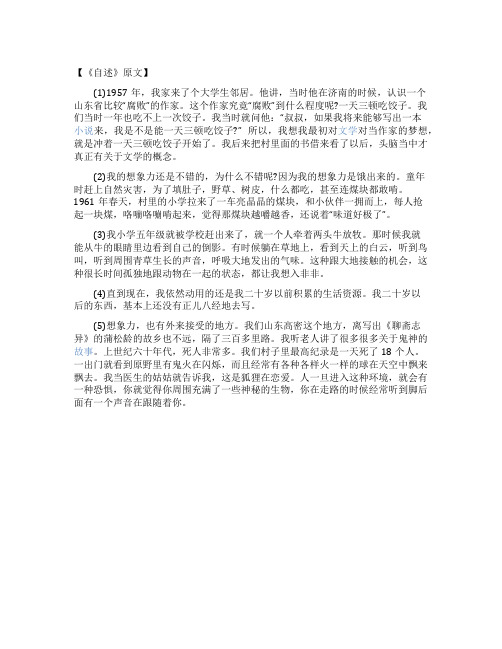
【《自述》原文】(1)1957年,我家来了个大学生邻居。
他讲,当时他在济南的时候,认识一个山东省比较“腐败”的作家。
这个作家究竟“腐败”到什么程度呢?一天三顿吃饺子。
我们当时一年也吃不上一次饺子。
我当时就问他:“叔叔,如果我将来能够写出一本小说来,我是不是能一天三顿吃饺子?” 所以,我想我最初对文学对当作家的梦想,就是冲着一天三顿吃饺子开始了。
我后来把村里面的书借来看了以后,头脑当中才真正有关于文学的概念。
(2)我的想象力还是不错的,为什么不错呢?因为我的想象力是饿出来的。
童年时赶上自然灾害,为了填肚子,野草、树皮,什么都吃,甚至连煤块都敢啃。
1961年春天,村里的小学拉来了一车亮晶晶的煤块,和小伙伴一拥而上,每人抢起一块煤,咯嘣咯嘣啃起来,觉得那煤块越嚼越香,还说着“味道好极了”。
(3)我小学五年级就被学校赶出来了,就一个人牵着两头牛放牧。
那时候我就能从牛的眼睛里边看到自己的倒影。
有时候躺在草地上,看到天上的白云,听到鸟叫,听到周围青草生长的声音,呼吸大地发出的气味。
这种跟大地接触的机会,这种很长时间孤独地跟动物在一起的状态,都让我想入非非。
(4)直到现在,我依然动用的还是我二十岁以前积累的生活资源。
我二十岁以后的东西,基本上还没有正儿八经地去写。
(5)想象力,也有外来接受的地方。
我们山东高密这个地方,离写出《聊斋志异》的蒲松龄的故乡也不远,隔了三百多里路。
我听老人讲了很多很多关于鬼神的故事。
上世纪六十年代,死人非常多。
我们村子里最高纪录是一天死了18个人。
一出门就看到原野里有鬼火在闪烁,而且经常有各种各样火一样的球在天空中飘来飘去。
我当医生的姑姑就告诉我,这是狐狸在恋爱。
人一旦进入这种环境,就会有一种恐惧,你就觉得你周围充满了一些神秘的生物,你在走路的时候经常听到脚后面有一个声音在跟随着你。
【名人故事】莫言 饥饿的人

【名人故事】莫言饥饿的人【名人故事】莫言-饥饿的人这家伙出生后就一直吃不饱,赶上了大多数中国人半饿死的时代。
每顿饭,他都匆匆吃完自己的那份,盯着别人的碗大声哭。
他一边哭,一边公然抢走表弟碗里的食物,引起了长时间的眼泪。
那是1960年的春天,能吃的东西似乎都吃光了。
草根、树皮、房檐上的草。
有一次学校拖来了一车好煤,他拿起一块就放在嘴里嚼,同学们也跟着一起嚼,都说越嚼越香。
一上课,老师在黑板上写,他们就在下边嚼煤,咯咯嘣嘣一片响,全都一嘴乌黑。
1976年,他饿了,向他道别。
当他被分配到一个新的单位时,他用八个面粉蒸包子。
他的肚子里还有空位,但他又不好意思再吃了。
厨师对食堂管理员说:“坏了,有个大肚皮的。
”后来,日子好过了,一上宴席,他却仍是迫不及待地,生怕捞不到似地吃。
好多朋友攻击他,说他吃起饭来奋不顾身,埋头苦干,好像狼一样。
他一次又一次地牢记他应该少吃多吃。
吃东西时,他的嘴不大声,眼睛也不邪恶。
当他搅拌蔬菜时,他只搅拌一道菜或一个豆芽,就像鸟一样。
他也想改变,但一看到美味的食物,他就立刻回到了原来的状态。
每当他在电视上看到鳄鱼吞咽和哭泣的可怕画面时,他立刻想到了自己。
当然,仅仅有饥饿的体验,并不一定就能成为作家,他能成为一个作家,是因为有个“右派”大学生说他认识一个作家,写了一本书,得了成千上万的稿费。
听说作家每天吃三顿饺子,而且还是肥肉馅儿的,咬一口,那些肥油就地往外冒。
他不相信世界上有那么多有钱的人,一天能吃三个饺子,但那个大学生轻蔑地对他说:他们是作家!你明白吗?作家从此,他就知道了,只要当了作家,就可以每天吃三次饺子,而且是肥肉馅儿。
那时,他就下定了决心,长大后一定要当一个作家。
他是著名作家莫言。
- 1、下载文档前请自行甄别文档内容的完整性,平台不提供额外的编辑、内容补充、找答案等附加服务。
- 2、"仅部分预览"的文档,不可在线预览部分如存在完整性等问题,可反馈申请退款(可完整预览的文档不适用该条件!)。
- 3、如文档侵犯您的权益,请联系客服反馈,我们会尽快为您处理(人工客服工作时间:9:00-18:30)。
莫言写作的饥饿诱因渴望一日三餐有饺子吃
THIS year's Nobel literature laureate chose his pen name Mo Yan, which means "Don't speak," as a reminder to himself that he should talk less and write more.
今年的诺贝尔文学奖获得者将他的笔名选择了莫言,意为“不要说话,”作为自我提醒,他应该少说话,多写作。
Mo, whose real name is Guan Moye, said he had "brought the family a lot of trouble" for his talkativeness when he was young.
莫言原名管谟业,说他年轻时的多嘴多舌“给家庭带来了很大的麻烦”。
"My mother felt so anguished and persuaded me to keep my mouth shut. I was so moved by her painful expression and swore to be silent since then," he said. "That's why I gave myself such a pen name when I started writing in 1981."
“我的母亲感到如此痛苦,并劝我闭嘴,她痛苦的表情使我伸手触动,并发誓从那时起保持沉默,”他说。
“这就是为什么我在1981年开始写作时,给自己取了这样一个笔名。
”
That was the year his novella, "Drizzle on a Spring Night," was published.
就在那一年,他的中篇小说《春夜雨霏霏》出版了。
Mo said several years ago that his literature dream stemmed from his crave for dumplings in the late 1950s when China was in economic difficulty.
莫言说,几年前,他的文学梦想源于20世纪50年代末中国处于经济困难时他对饺子的渴望。
He recalled that a writer became his new neighbor in Jinan, capital of his native Shandong Province, and had dumplings for three meals a day, a luxury for a common Chinese then.
他回顾说,在他的家乡山东省省会济南一个作家成为了他的新邻居,并且一日三餐都有饺子吃,那时饺子是一个普通中国人的奢侈品。
"At that time, my family couldn't afford such a meal in one year," Mo said in a speech in Open University of Hong Kong.
莫言在香港公开大学的一次演讲中说:“那时,我的家庭一年之中都负担不起这样的饭。
”Mo said he began to nurse a dream of becoming a writer, with three dumpling meals every day.
莫言说,他开始萌生了成为一名作家的梦想,一日三餐吃饺子。
His early education was cut short at the age of 12 by the "cultural revolution," a decade of political chaos when many of China's schools closed down.
他的早期教育在12岁时被“文化大革命”切断,一场十年的政治混乱,当时中国的许多学校都关闭了。
Instead of avoiding memories of his poverty-stricken childhood, Mo valued it so much he said in a speech at Stanford University in California that "loneliness and hunger were my fortunes of creation."
莫言不是回避他贫困的童年记忆,而是非常珍视它们,他在美国加利福尼亚州的斯坦福大学那场“孤独和饥饿是我创作的财富”的演讲中说道。
"When I was five or six, the whole nation was hungry. I had a deep love for food. Even now I feel tears in my eyes when I touch the rice in supermarkets," he said.
“当我五六岁时,全国人民都很饥饿。
我对食物狂热的爱,即使现在当我在超市触摸到大米时,我觉得我眼里仍含着泪水,”他说。
When he joined the army in 1976, he once filled his stomach with 18 buns.
当他1976年参军时,他曾经往肚子里塞了18个馒头。
Mo has applied his experiences as well as relatives' stories to his works.
莫言把他的经历以及亲人的故事都写到了他的作品中。
He created the figure "rural doctor" based on his aunt in his novel "Frogs," and described a typical Chinese intellectual called Shangguan Jintong to reflect his spirit in the book "Big Breasts and Wide Hips."
他在小说《蛙》里创造的人物“乡村医生”是以他的姨妈为原型的,在他的书《丰乳肥臀》中描述了一个叫上官金童的典型中国知识分子以折射其精神。
"The folk arts and folk culture accompanied my growth and I was influenced by the cultural elements I witnessed through my childhood in the rural areas. When I picked up the pen for the creation of literature, the folk cultural elements inevitably entered my novels and affected and even determined the artistic styles of my works," he said.
“民间艺术和民俗文化伴随着我成长,我深受我童年时在农村目睹的文化元素的影响。
当我拿起笔进行文学创作时,民间文化元素不可避免地进入我的小说,影响甚至决定了我作品的艺术风格,”他说。
Though Mo is intellectually sharp, he is an ordinary man in daily life. He married a factory co-worker about 30 years ago.
尽管莫言是思维敏捷,但在日常生活中他是一个普通人。
大约30年前他娶了一个工厂同事。
